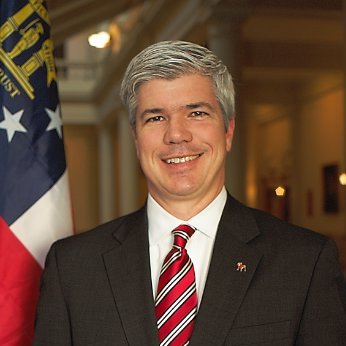
Photograph courtesy of Common Cause Georgia
Few people have drawn the ire of Georgia’s top officials like William Perry. Whether he’s fanning the flames around Gov. Nathan Deal’s alleged corruption, or trying to collect enough petitions to block public funding for the Atlanta Falcons stadium, the executive director of the traditionally nonpartisan watchdog group Common Cause Georgia has remained a rare thorn in the side of the state’s most powerful officials. But he’ll be investigating politicians on his own after being ousted from an organization that has arguably shifted from a nonpartisan agenda to a progressive focus.
On Tuesday morning, Perry parted ways with Common Cause after more than four years, the latest move in a string of recent shakeups within the organization’s Georgia chapter. Last week, Common Cause President Miles Rapoport asked Perry to resign. The move, which comes on the heels of the removal of two Georgia board members—including Chairman Bob Irvin—and the recent appointment of former GOP operative Clint Murphy as Irvin’s replacement, stands in line with the organization’s broader national shift away from filing ethics complaints toward a “broader policy agenda for an inclusive democracy.”
Compared to other state chapters, Common Cause Georgia’s operation has strived to remain non-partisan for decades. It’s also an outlier within the national organization because its staffers and lobbyists advocate for good government, while attempting to hold public officials accountable for potential corruption. That has long put the group in a tough position: How do you effectively push ethics reform at the state Capitol while filing an ethics complaint against the House speaker? How do you ask City Hall to pass a pay-to-play ordinance when you’re bashing the mayor over the legitimacy of airport concessions contracts? That dual role often forced the organization to bite the hand that feeds it—with predictably mixed results.
“It’s difficult to advocate for public policy when you’re also filing ethics complaints and calling out public officials,” Perry says. “The only recourse they have against you is not passing the policy you’re pushing.”
Perry, who was initially “surprised “about the resignation request, says he came to a mutual understanding with Rapoport. He’s now planning to start a new nonpartisan watchdog organization focused on filing ethics complaints and continuing to hold politicians’ feet to the fire. That’s actually new territory for Perry, who says that, during his time as executive director, Common Cause Georgia only filed two complaints—one related to a $17,000 lobbyist-funded European trip for House Speaker David Ralston, R-Blue Ridge, and one against state Rep. Mike Glanton, D-Jonesboro, over a contract between his private business and Atlanta Public Schools. He sees the opportunity to create an organization solely devoted to watchdog activism—which he says Georgia lacks right now. He’s now in the process of incorporating the group, raising funds, and finalizing a name.
With Perry’s departure, Common Cause Georgia will now become more closely aligned with the national organization’s more left-leaning mission. As a result, Common Cause Georgia will venture beyond what’s traditionally fallen inside their wheelhouse such as voting rights, and economic equality, or environmental advocacy.
As a national organization, Common Cause stands to gain more clout now that it’s tightening its focus. But, given it emphasis on liberal issues, many of which remain nonstarters in a red state like Georgia, the recent changes could reduce its effectiveness inside the Capitol. Irvin, a former Republican state legislator who served six years as House minority leader, says the changes will “totally destroy the credibility Common Cause Georgia had as a nonpartisan organization focused on ethics, openness, and accountability.”
“When you destroy your credibility, you destroy your effectiveness to advocate on those issues,” Irvin says. “It’s a tragedy for the people of Georgia. You need a truly nonpartisan watchdog organizations, and there isn’t another one.”
Murphy, however, says he “absolutely disagrees” with the characterization that Common Cause Georgia is becoming a left-wing group. “I think Common Cause is going to remain strong in what its mission is,” he says. Moving forward, he says the organization’s relationship with state lawmakers will remain the same as they push for stronger ethics laws, independent redistricting, and pay-to-play reform. He expects business to be usual inside the Capitol—except for that whole watchdog part.













